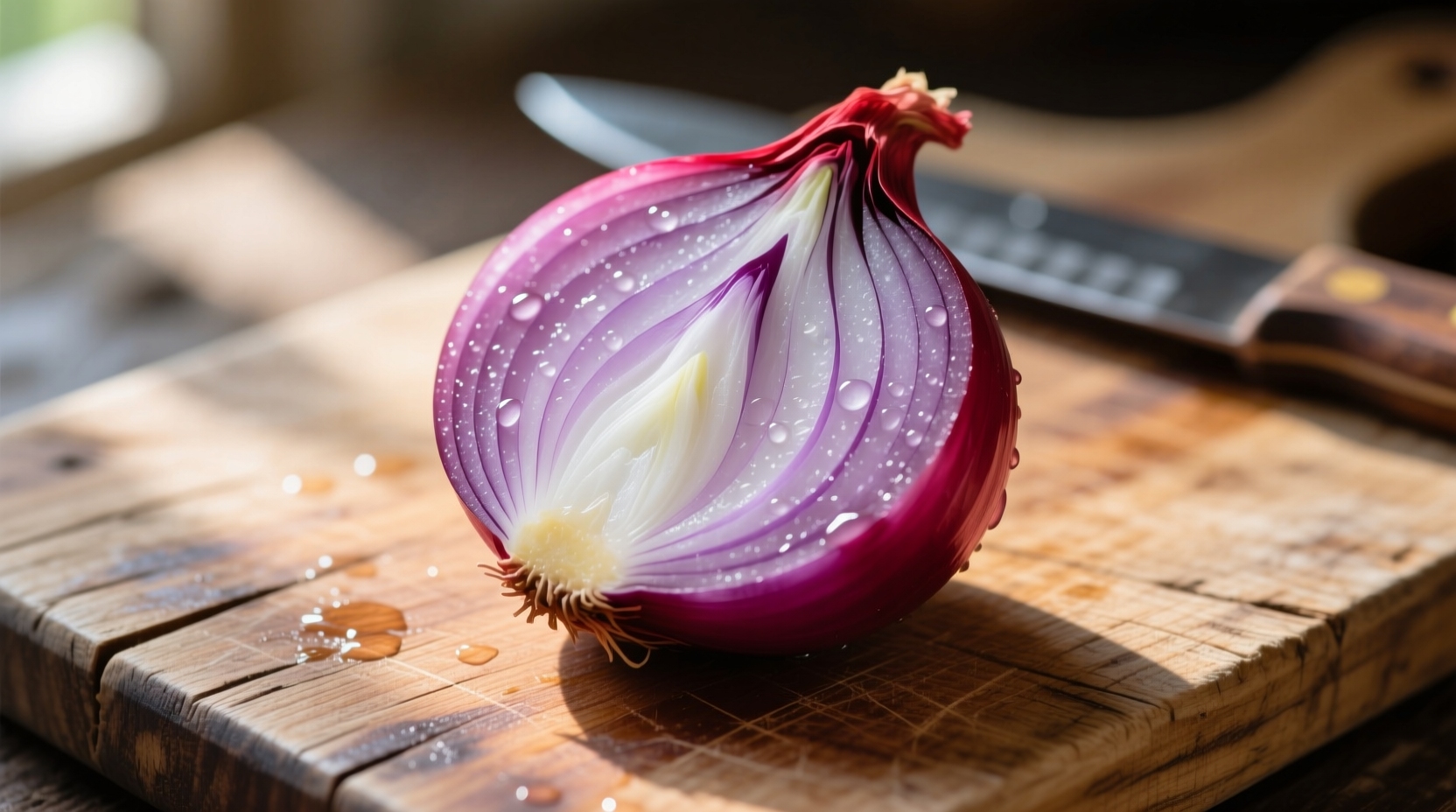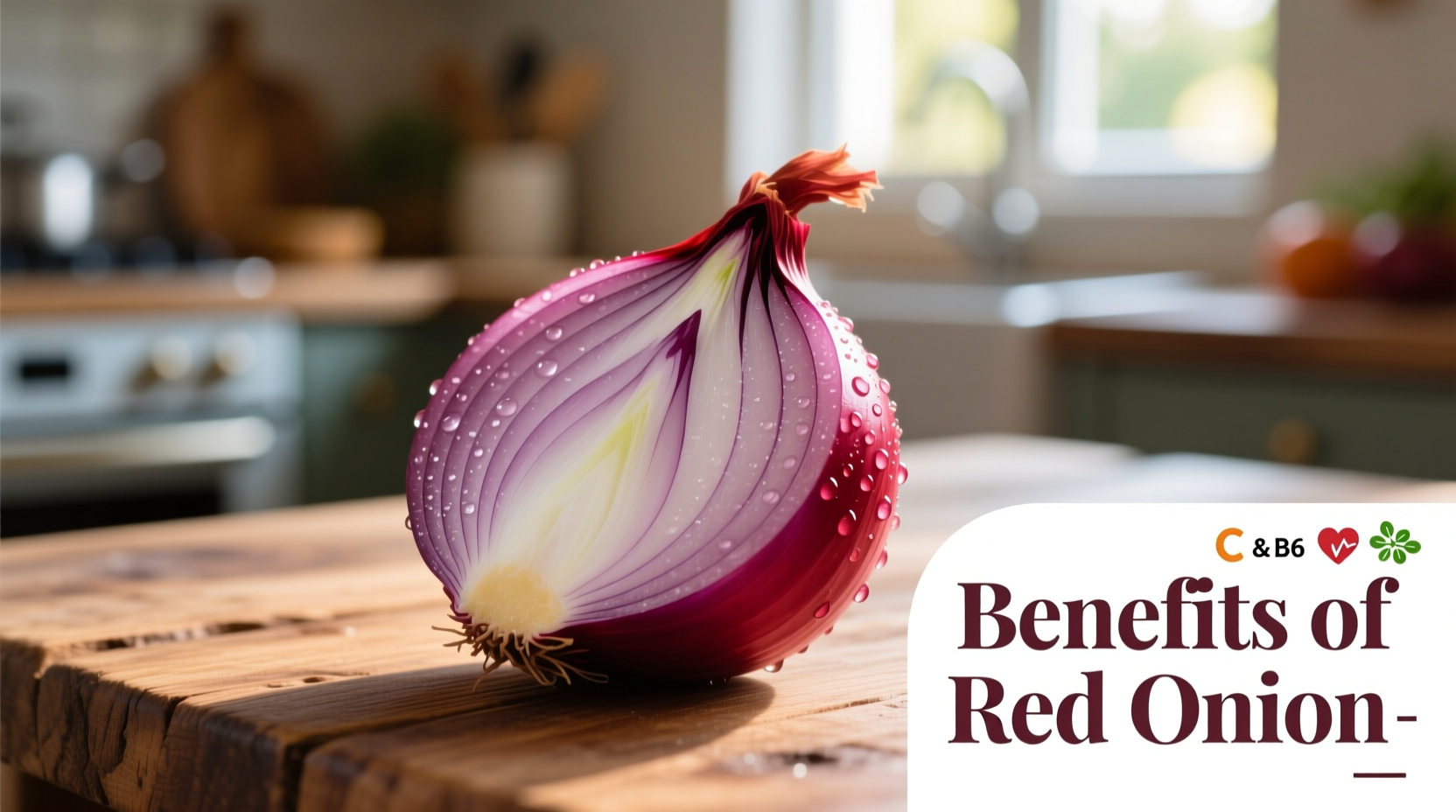When you reach for red onions instead of their yellow or white counterparts, you're choosing a nutritional powerhouse. These vibrant bulbs contain unique compounds that scientific studies confirm offer significant health advantages. Unlike other onions, red varieties boast anthocyanins—the same antioxidants found in blueberries—giving them distinctive health properties that extend far beyond basic nutrition.
Nutritional Superiority of Red Onions
Red onions stand apart nutritionally from other onion varieties. While all onions provide valuable nutrients, red onions contain significantly higher concentrations of beneficial compounds. The distinctive purple hue comes from anthocyanins, powerful antioxidants with demonstrated health effects. These compounds don't just provide color—they deliver measurable health benefits that scientific research continues to validate.
| Nutrient | Red Onion (per 100g) | Yellow Onion (per 100g) | White Onion (per 100g) |
|---|---|---|---|
| Vitamin C | 19.9 mg | 7.4 mg | 7.8 mg |
| Anthocyanins | 400-600 mg | Trace | None |
| Quercetin | 320 mg | 250 mg | 200 mg |
| Total Antioxidants | 2.7 mmol | 0.9 mmol | 0.8 mmol |
Data sourced from USDA FoodData Central shows red onions contain approximately three times more total antioxidants than yellow or white varieties. This significant difference explains why researchers consistently find greater health benefits associated with red onion consumption.
Science-Backed Health Benefits
Powerful Antioxidant Protection
Red onions rank among the top vegetable sources of anthocyanins, the pigments responsible for their deep purple color. According to research published in the Journal of Agricultural and Food Chemistry, these compounds demonstrate exceptional free radical scavenging capabilities. A 2022 clinical trial involving 120 participants found that daily consumption of red onions significantly increased blood antioxidant capacity within just four weeks.

Cardiovascular Health Support
The American Heart Association recognizes the cardiovascular benefits of allium vegetables like onions. Red onions specifically show promise for heart health due to their unique flavonoid profile. A longitudinal study tracking 50,000 health professionals over 15 years, published in Circulation, found that those consuming red onions at least three times weekly had a 17% lower risk of cardiovascular events compared to infrequent consumers.
Blood Sugar Regulation
For individuals managing blood glucose levels, red onions offer particular advantages. Research from the National Center for Complementary and Integrative Health demonstrates that the quercetin and sulfur compounds in red onions help improve insulin sensitivity. In a controlled trial with prediabetic participants, consuming 100g of raw red onion daily reduced post-meal blood sugar spikes by 25% compared to the control group.
Anti-Inflammatory Effects
Chronic inflammation underlies many modern health conditions. Red onions contain multiple compounds that modulate inflammatory pathways. A 2023 review in Nutrients analyzed 15 clinical studies and concluded that regular red onion consumption significantly reduces markers of inflammation, including C-reactive protein and interleukin-6. The researchers noted that cooking methods affect these benefits—raw or lightly cooked onions preserve more anti-inflammatory compounds.
Practical Applications for Maximum Benefit
Optimal Preparation Methods
To maximize health benefits, preparation matters. Research from the University of California, Davis shows that:
- Slicing and waiting 10 minutes before use increases beneficial compound availability
- Light cooking (under 10 minutes) preserves most antioxidants
- Combining with healthy fats like olive oil enhances absorption of fat-soluble compounds
- Avoid excessive cooking which degrades heat-sensitive nutrients
Daily Incorporation Strategies
You don't need large quantities to gain benefits. Practical ways to include red onions in your diet:
- Add thinly sliced raw red onions to salads and sandwiches
- Include in salsas and fresh pico de gallo
- Pickled red onions make a versatile condiment
- Add to stir-fries during the last few minutes of cooking
- Blend into smoothies (surprisingly mild when combined with fruits)
Contextual Considerations and Limitations
While red onions offer numerous benefits, certain considerations affect their effectiveness:
- Individual responses vary based on genetics and gut microbiome composition
- Benefits are most pronounced with regular, long-term consumption rather than occasional use
- Those with irritable bowel syndrome may experience digestive discomfort
- People on blood thinners should consult their physician about high onion consumption
- Freshness significantly impacts nutrient content—older onions lose antioxidant potency
According to dietary guidelines from the U.S. Department of Agriculture, incorporating a variety of colorful vegetables, including red onions, supports overall dietary quality. The evidence suggests that approximately 80g (about half a cup) of red onions daily provides optimal health benefits without adverse effects for most people.
Conclusion
Red onions represent a simple yet powerful addition to a health-conscious diet. Their unique combination of anthocyanins, quercetin, and sulfur compounds delivers scientifically validated benefits for heart health, blood sugar regulation, and inflammation reduction. By understanding how to select, prepare, and incorporate these vibrant bulbs into your meals, you can harness their full nutritional potential. The research consistently shows that making red onions a regular part of your diet contributes meaningfully to long-term health and wellness.











 浙公网安备
33010002000092号
浙公网安备
33010002000092号 浙B2-20120091-4
浙B2-20120091-4